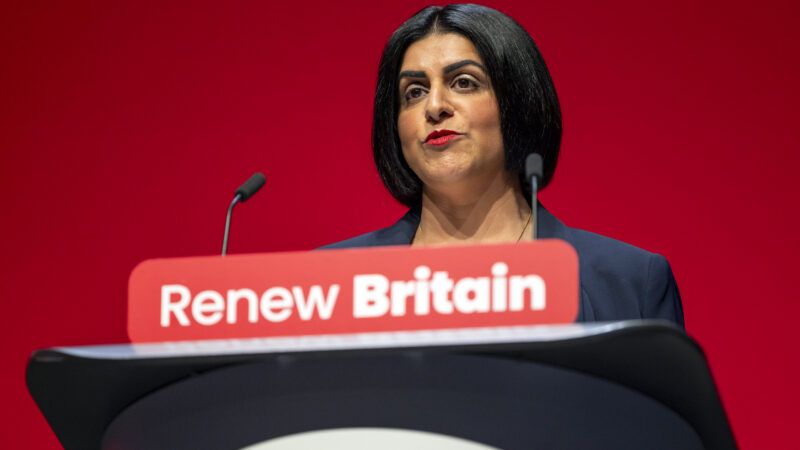British Minister: 'Just Because You Have a Freedom Doesn't Mean You Have To Use It'
Home Secretary Shabana Mahmood is moving to ban protests that annoy the public.

The British government has a very peculiar definition of freedom. In a Sunday interview with the BBC explaining new restrictions on protest, Home Secretary Shabana Mahmood implied that freedom is something the public shouldn't exercise freely if it bothers others. And the sentiment is bipartisan.
"This is not about a ban. This is about restrictions and conditions," Mahmood said. "Just because you have a freedom doesn't mean you have to use it at every moment of every day," she added.
She added that police will have to strike a "balance" between "allowing people to protest, which is an ancient freedom in this country" and "the rights of the wider community to go about their business free from intimidation and fear."
Kemi Badenoch, leader of the opposition Conservative Party, agreed with her rival, telling the BBC in a separate interview that "we believe in free speech, but that has to be within the bounds of the law. If protests are used to intimidate, to incite hatred, then that is not protest." Last year, the courts struck down anti-protest laws passed by a previous Conservative government.
Under Mahmood's new protest regulations, police will be able to move, reschedule, or limit the size of protests based on the "cumulative disruption" caused by similar protests. In other words, if a movement is annoying enough to the powers that be, they can push it off the streets.
These restrictions will be enforced under the Public Order Act of 1986, which allows for six-month jail sentences and/or unlimited fines for violators.
The immediate context of the restrictions is an attempt to crack down on pro-Palestinian unrest. The British government designated Palestine Action a terrorist organization in July 2025 after its members vandalized military equipment allegedly destined for the Middle East. Under British law, even expressing verbal support for terrorism is illegal, and hundreds of people have been arrested protesting in favor of Palestine Action.
After a deadly stabbing attack on a synagogue last week, Prime Minister Keir Starmer called on protesters to stop in order to "respect the grief of British Jews." On Saturday, police arrested 500 people in London for protesting under banners that supported Palestine Action.
But the British government has also cracked down on anti-Palestinian speech. For example, police arrested and interrogated Yorkshire man Pete North in late September for sharing a meme several months ago that said, "Fuck Palestine. Fuck Hamas. Fuck Islam. Want to protest? Fuck off to Muslim country and protest." He was released without charge.
That crackdown seems to be a response to race riots in the summer of 2024, sparked by a wave of anti-immigrant sentiment. Starmer blamed social media for the violence. Earlier this year, British police charged anti-immigration activist Tommy Robinson for "harassment" over his actions during the unrest.
And the authorities have gone after causes across the political spectrum. Last year, a British court acquitted schoolteacher Marieha Hussain for "racially aggravated" public disorder after she was photographed holding up a placard that depicted Conservative Party politicians Suella Braverman and Rishi Sunak as coconuts, meaning that they were "brown" on the outside and "white" on the inside.
Last month, British police snatched up Irish comedian Graham Linehan at the airport for a post he made about punching trans people "in the balls." Last year, a British court convicted anti-abortion activist Adam Smith-Connor for silently praying outside a clinic, a case that U.S. Vice President J.D. Vance brought up in a speech attacking "the retreat of Europe from some of its most fundamental values."
British police arrest an average of 30 people per day for offensive online content, according to data obtained by The Times. Arrests have been rapidly increasing—police arrested twice as many people over their posts in 2023 than in 2017—even as convictions fall.
Although the progressive Labour Party currently holds power, some dissidents on the left are worried about the speech crackdowns, especially as polls project a blowout for Nigel Farage's right-wing Reform Party in the 2029 election.
"Street protest that isn't a bit of a nuisance isn't usually effective. But any government seeking to further restrict it should think about new powers in Farragist hands," Labour peer Shami Chakrabarti told The Guardian.


Show Comments (36)